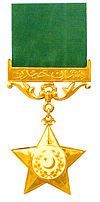Muhammad Akram
This article possibly contains original research. (November 2017) |
Muhammad Akram | |
|---|---|
 | |
| Born | 4 April 1938 Dinga city in Gujrat District, Punjab British India |
| Died | 5 December 1971 (aged 33) Hilli, Dinajpur, East-Pakistan |
| Buried | |
| Allegiance | |
| Branch/service | |
| Years of service | 1956–71 |
| Rank | |
| Unit | |
| Commands held | 4th Btn. Frontier Force Regiment |
| Battles/wars | Indo-Pakistani war of 1965 Bangladesh Liberation War |
| Memorials | |
| Website | ISPR website |
Major Muhammad Akram (Urdu: محمد اکرم; c. 4 April 1938 – 5 December 1971) NH, was a military officer in the Pakistan Army who was cited with the Nishan-e-Haider posthumously after the military confrontation took place in railway station in Hilli, East-Pakistan.[1]
Biography[]
Muhammad Akram belongs to Dinga, a small city in Gujrat.[2] He hails from Nakka Kalan a small village in District Jhelum and belongs to Punjabi Malik Awan (tribe) family. He was born on 4 April 1938.[3] He was a military brat and his father, Malik S. Muhammad, was an enlisted personnel in the British Army who later retired as a Havildar, an army sergeant, in the Pakistan Army.[3] After securing his graduation from a local middle school in Nakka Kalan, Akram entered to join the Military College Jhelum– an ROTC and an army's OCS in Jhelum, Punjab.[3][4]
In 1953, he dropped out from the Military College Jhelum due to his father's deployment, and had to take the High School equivalency exam where he took examinations in geography and intermediate education.[3] In 1956, he was enlisted in the Pakistan Army and posted with the 8th Punjab Regiment near India-Pakistan border.[3]
In 1959, Muhammad Akram was invited to attend the Pakistan Military Academy but only spent a semester after being deployed in East-Pakistan as a Corporal.[3] He received commission in the Army through his years of attendance at the army's OCS in Jhelum in 1961, and was attached to the East Pakistan Rifles as a military advisor in 1963 till 1965.[3] In 1965, Capt. Akram was stationed in different parts of the West-Pakistan before being deployed in East-Pakistan as a quartermaster with the Frontier Force Regiment till 1967–68.[3]
Nishan-e-Haider action[]

In 1968–70, Maj. Akram served with the 4th battalion posted with the Frontier Force Regiment, eventually becoming its commanding officer by 1971.[5]
During the east Pakistan War of 1971, the 4th FF Regiment, which at that time was commanded by then Col. Muhammad Mumtaz Malik, was placed in the forward area of the Hilli Municipality (under Hakimpur Upazila, Dinajpur District), in what was then East Pakistan.[citation needed] The regiment came under continuous and heavy air, artillery and armour attacks from the Indian Army. Despite enemy superiority in both numbers and firepower, Akram and his men repulsed many attacks, inflicting heavy casualties on the enemy.[6] He was killed in action in the attack and was posthumously awarded the Nishan-e-Haider, Pakistan's highest military honour.[6]
He was buried in the village of Boaldar, Thana/Upozila-Hakimpur (Banglahilly), District-Dinajpur. There is a monument, Major Akram Shaheed Memorial, in the midst of Jhelum city.[citation needed]
Awards and decorations[]

| Nishan-e-Haider (NH) |
References[]
- ^ Pakistan Army Website, retrieved 10 February 2013[permanent dead link]
- ^ bc, bloggerscouncil (6 September 2009). "Major Muhammad Akram Shaheed Family | Sarah Peracha Blog". www.saltnpepperblog.com (in Urdu). Sarah Peracha. Retrieved 9 September 2021.
- ^ Jump up to: a b c d e f g h ub, urdubiography (12 May 2012). "Major Muhammad Akram Shaheed | Major Muhammad Akram History in Urdu". www.urdubiography.com (in Urdu). www.urdubiography.com. Retrieved 26 May 2019.
- ^ "ALAMGIRIAN SHUHADA – Military College Jhelum". militarycollege.edu.pk. Retrieved 18 October 2017.
- ^ "Major Muhammad Akram Shaheed - Dost Pakistan". www.dostpakistan.pk. Retrieved 22 October 2019.
- ^ Jump up to: a b Shaheed Foundation Website, retrieved 10 February 2013
| Wikimedia Commons has media related to Raja Muhammad Akram. |
- 1938 births
- 1971 deaths
- Punjabi people
- People from Gujrat District
- People from Jhelum
- Pakistan Military Academy alumni
- Pakistan Army officers
- People of East Pakistan
- People of the Indo-Pakistani War of 1971
- Pakistani military personnel killed in action
- Recipients of Nishan-e-Haider
